#but like given the circumstances
Text
bg3 just says hey asshole. here's someone whose been dragged through the worst fate imaginable by an uncaring and cruel pantheon of gods and would-be gods against which they are fundamentally powerless. and guess what, shitstain? they still choose every day to be kind against the mounting allure and ease of cruelty. yeah that's right. and you'll never guess why. It's because of all the horrors, not in spite of them. Get fucked.
#bg3#baldurs gate 3#bg3 karlach#karlach#dame aylin#wyll ravengard#shadowheart#not astarion#but like given the circumstances#yeah id be an asshole too#not saying its right just saying if you put me through that shit i would take it as a license to kill too#the dark urge
219 notes
·
View notes
Text
warhammer 40k loves to call itself a satire of fascism and then depicts a universe in which all of the great fascistic anxieties and beliefs of its imperium (the enemy is everywhere, it is both weak and strong, we are eternal, any violence we commit is justified, our leader is our genetic superior, degeneracy will lead to the collapse of our society) are all objectively true, completely blunting any satirical edge it could have, but giving it just enough plausible deniability that games workshop can market to anyone of any ideology
#discourse#warhammer 40k#and like i say this as someone who LIKES warhammer 40k#a functional satire probably shouldnt present the people its satirizing as objectively correct given their circumstances
4K notes
·
View notes
Text
psychonauts is like. what if you met your hero and he turned out to be a silly, kind, down to earth guy who was willing to be there for you at a moments notice and was also personally responsible for every bad thing that'd ever happened to your family specifically
#like in the grand scheme of things what ford did isn't that crazy#it makes sense given the circumstances#someone looking at it from the outside might call it the kind thing to do#but god if it didn't fuck up the aquato family forever and ever#psychonauts#psychonauts 2#psychonauts 2 spoilers#psychonaut spoilers#Ford cruller#raz aquato#pnat#pnat spoilers
2K notes
·
View notes
Text

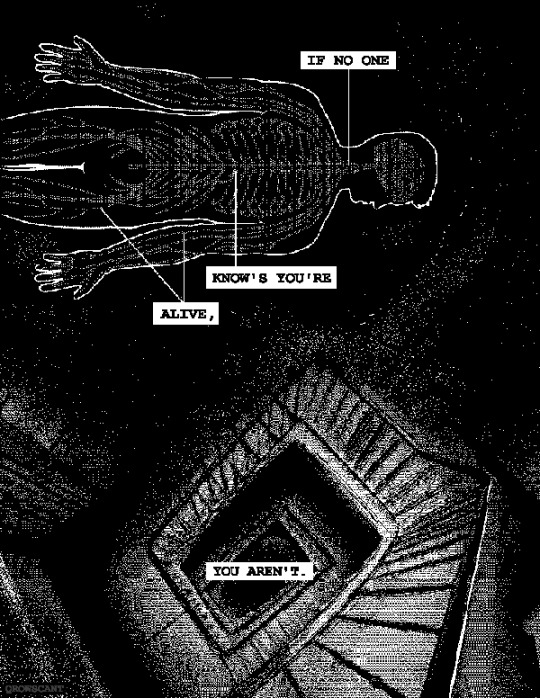
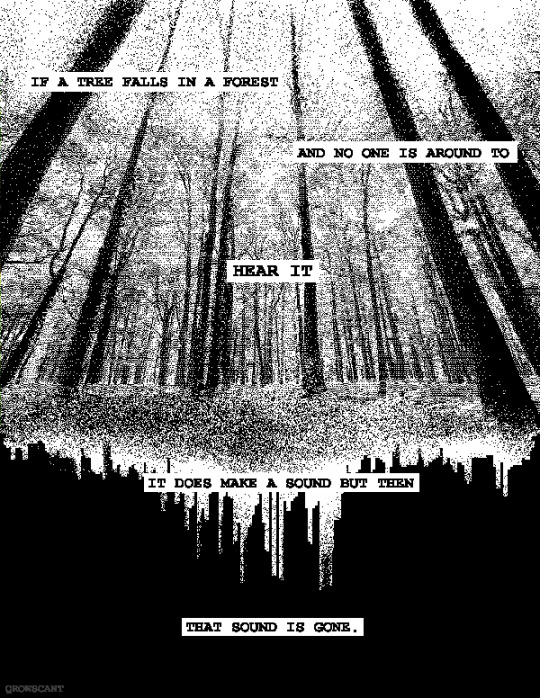
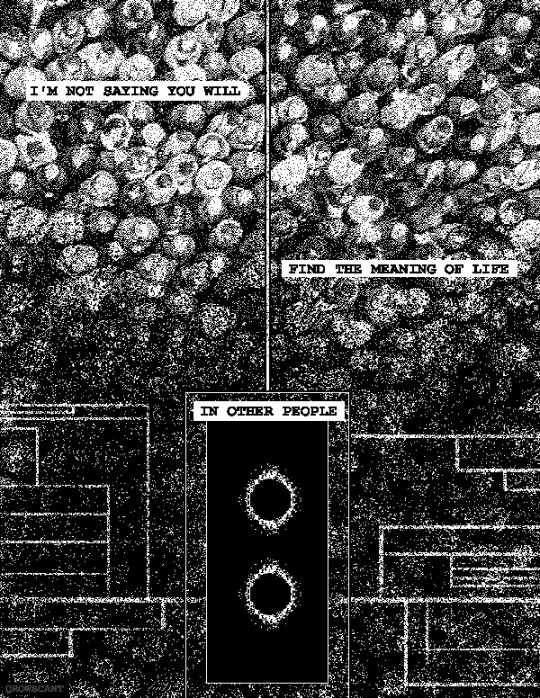
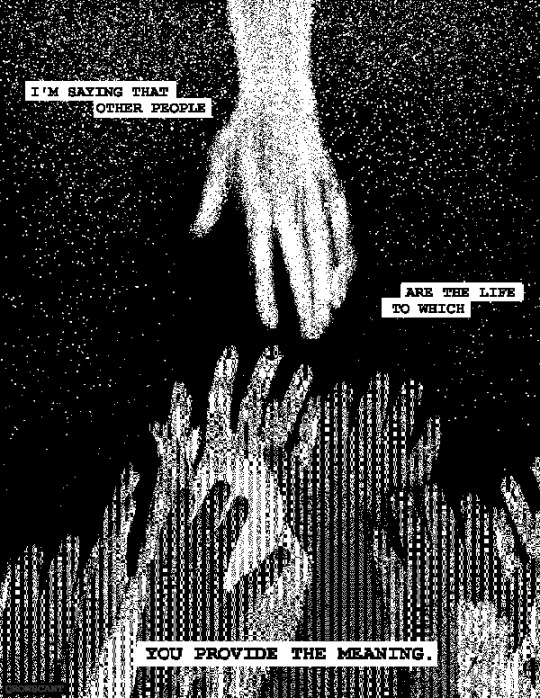
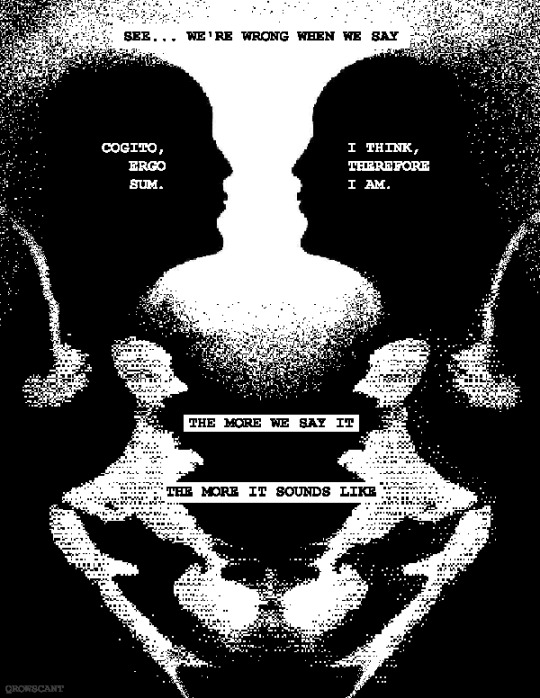
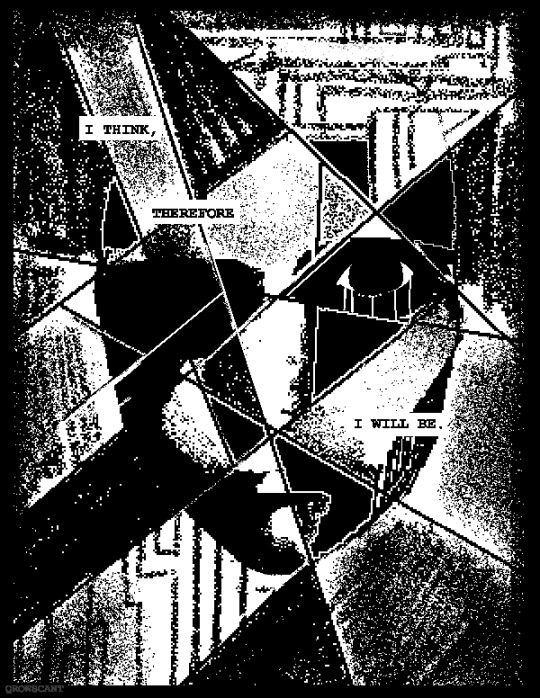
i hear the world is ending soon.
when we go, and we're all going to go
i will be... part of it.
"this is not the end of the world" by neil hilborn
#poem#writeblr#dithering#pixel art#artists on tumblr#monochrome#mal-art#tthw#when i read the poem i just went aaahhhhhhhhhhhh because i think it captures IS' relationship with fodder so well#how being given sentience and then stripped of autonomy absolutely ruined him#and then finding one person who understood your circumstances and was willing to speak to you like you really existed#and then having that person be ripped away for reasons neither party could control#like ow! ouchie!
4K notes
·
View notes
Text
Odysseus' level of simping is so fucking high that when he's half drowned, unconscious and sleep talking, he's STILL going on about his wife
#like#half of his brain is occupied by penelope#at ANY given time#it does not matter the circumstances#when he opens his mouth there is always a 50/50 chance he will talk about his wife#epic the musical#epic the wisdom saga#wisdom saga spoilers
257 notes
·
View notes
Text
Thinking about the weird camaraderie that exists between demons but not angels in GO.
Have we ever seen two angels who are actually friends? Or even friendly to one another? We have met angels with a capacity to be friendly in general, but I think the closest we've come to two angels actually getting along would be Gabriel making a point to laugh at Sandalphon's terrible "can't have a war without War" line in S1.
Most scenes between the angels actually seem to have an undercurrent of absolute hostility. Teeth-clenched teamwork. No wonder it took them so long to notice that Aziraphale wasn't on the same page as the rest of them! The rest of them are barely on the same page as one another, either! When Gabriel goes against the majority vote, no one bats an eye at demoting him and wiping his memory. Michael and Uriel immediately begin vying for his job. The only times we've seen angels team up is when they're working together to bully someone else, like when they're trying to intimidate Aziraphale in S1 or going to the aftermath of the bookshop raid in S2.
Saraqael's overall neutrality towards Muriel is the closest we get to two angels in Heaven getting along, and it's more a lack of hostility than any kind of friendliness. At least until Gabriel loses his memories and Muriel shows up to spy on Aziraphale, and Aziraphale decides to be kind to both of them.
Demons, on the other hand, actually seem to form alliances and even friendships among one another. Hastur and Ligur are awful, but Hastur seems genuinely distraught over Ligur's death, not just fearful of suffering the same fate. Shax and Furfur conspire together and even though the 1940's investigation into Crowley's fraternizing doesn't work out for Furfur, it's not due to any double-crossing on Shax's part. Unlike the angels, who stick almost exclusively to making threats until the Metatron decides to try dangling a carrot at the end of the season, demons actually offer rewards to other demons when trying to work together. Beelzebub offers Crowley a promotion if he can bring them Gabriel, Furfur offers to back Shax up politically if she goes for the Duke position opening, and Crowley successfully stalls Hastur in S1 by pretending everything was a test and he's going to be put in charge of a legion as a reward for passing. They're still not great at socializing, but they're significantly ahead of the angels.
Of course, it's a fact that demons are awful to one another (Eric's treatment is really bad, they throw that random demon into holy water just to test it, "it'd be a funny world if demons went around trusting one another", etc) but they still seem more capable of forming friendships than the angels do.
I think that's because Hell cramps and crowds everyone together to try and increase their suffering and hostility, whereas Heaven isolates angels to decrease the odds of questioning or rebellion. Hell's methods are unpleasant, but it still ends up putting demons together, and some of those demons inevitably forge alliances and make friendships. Because as Crowley and Beelzebub demonstrate, demons are still social creatures with the capacity for love and affection, even if it's strongly discouraged and buried under nine million layers of trauma and a cultural mandate against kindness.
Angels are the same, but isolation makes is harder to form connections than overcrowding. Muriel and Jimbriel are both so eager to make friends, but Muriel's spent the past millennia shut in an empty office, and Gabriel has been distanced from his peers both through his position and also through Heaven's culture of fear and surveillance. He only breaks away from it when he finds something that's stronger than "choosing sides" (stronger than the fear of being rejected by Heaven and Falling, in fact strong enough that Falling seems worth it if he gets to be with someone he loves). Both Muriel and Gabriel are only able to start forming connections when they're away from Heaven.
I just think it's interesting that demons, despite being supposedly devoid of love, have an advantage in forming relationships compared to angels. Angels are supposed to love, but have far fewer opportunities to actually do so. Demons aren't supposed to love, but they make connections anyway.
#good omens#ineffable bureaucracy#both angels and demons are suckers for a bit of kindness too#even if they pretend otherwise and even if there are exceptions to the rule#like yeah you're probably not gonna win over the likes of hastur or michael with a nicety#but according to word of god furfur would be highly susceptible to a kind word#and well we see how it is with muriel and jim#i think this is why shax also weirdly toes the line between getting crowley destroyed and being almost-friends with him#that's just how it works in hell when you don't actually despise somebody#you can't be nice to them but you're still also kind of helpful and non-hostile a lot#don't let it interfere with your goals but sure deliver their mail and get their help with your boiler issues why not#maggie took the wrong approach to confronting the demons#if she'd been nice instead of telling them off they wouldn't have known how to handle it i bet#they're USED to being mocked and yelled at#should have given them jim's tray of canapes and offered them tea and stuff#not that I expect anyone to intuit that under the circumstances just that it might have actually held them off a lot longer#bunch of demons sitting outside of a bookshop passing around a tray of tiny little dinners and listening to records playing from inside
578 notes
·
View notes
Text
another mena language post - i wanted to talk about judeo-arabic and clarify a little bit about what "judeo-arabic" means
the basics, for those of you who don't know: arabic, being a language that was spread over a large part of the world and has since evolved into many different forms, has many different things that differentiate certain dialects. languages/dialects can be influenced by languages speakers' ancestors spoke before, by the social structure of where speakers live, by languages they come into contact with, and by gradual evolution in pronunciation. (many letters like evolving into ones that are easier to pronounce - this is why arabic has no "p" sound, it eventually evolved into "f" or "b". the same thing happened in germanic languages to some extent, which is why we say "father" in english and "vader" in german while in romance languages it's some variation of "padre" or "père".) many arabic dialects in particular possess different substratum (obvious, traceable influence from languages people spoke in before shifting to the new one).
arabic, being a language that was spread over a large part of the world and has since evolved into many different forms, has many different regional dialects which are different for the reasons i described in the above paragraph. even though there's modern standard arabic (which is the subject of its own post), people speak regional dialects in real life. on top of that, there's a variety of social influences on different types of arabic, such as whether someone's living in the city or in the country, whether someone's sedentary or a bedouin, and in some cases religion.
in the middle east, religion was historically:
not seen as a personal choice, but as something you're born into and a group you're a part of, kind of like ethnicity;
not generally something governments actively wanted everyone to share one of at the penalty of ostracization due to sticking to your group being the more livable way of life in the area, or later, the benefits of things like imposing extra taxes on people who weren't the "correct" religion/branch (this is far from being a "muslim thing" btw, it's been in the area for a while now, i mean look at the assyrians);
an influential factor in where you lived and who you were more likely to interact with because of those two things. (for example, it wasn't uncommon for most of the people living in one village in the countryside to share one religion/branch of a religion. if your village converted, you converted, too. if they didn't, you didn't, either.)
this means that the influence of religion in different types of arabic is due to people of different religions living in or coming from different places, and who people talked to most often.
for example, in bahrain, most sedentary shia bahrainis' ancestors have lived on the island for a very long time, while most sedentary sunni bahrainis' ancestors immigrated from other places in the gulf and iran in the 18th century. therefore, while they've all interacted and shared different aspects of their dialects including loanwords, there are two "types" of bahraini arabic considered distinctive to sunni and shia bahrainis respectively, regardless of how long ago their ancestors got there. despite the differences being marked by the religion of the speakers, they have nothing to do with religion or contact/lack thereof between bahraini sunni and shia, but with the factors affecting the different dialects i mentioned in the first paragraph which influenced either group.
a similar phenomenon to this in english is class differences in accent in england. nothing in received pronunciation is actually something only rich people can say or unintelligible to poor people, it developed by the class differences influencing where rich and poor english people lived and the different pronunciation/linguistic histories in those places, as well with different classes keeping more to themselves.
the influence of religion on arabic dialects isn't universal and nowhere near as intense as it is with aramaic. some places, especially more cosmopolitan or densely populated places, are less likely to have very noticeable differences or any differences at all. in addition, certain variations of a dialects that may've been influenced by religion in some way (as well as urban dialects) may be standardized through tv/movies/social media or through generally being seen as more "prestigious", making more people who wouldn't have spoken them otherwise more likely to pick it up. (this is why so many arabic speakers can understand egyptian arabic - cairo is like the hollywood of the arabic-speaking world.) this is the case with many if not most countries' official and regional languages/dialects nowadays.
this phenomenon is what "judeo-arabic" refers to generally. like many other jewish diaspora languages, the "jewish" aspect is that it was a specific thing jewish people did to different types of arabic, not that it was isolated, possessed a large enough amount of certain loanwords (though some varieties did have them), or is unintelligible to non-jews. people were generally aware of differences where they existed and navigated between them. (for example, baghdadi jews may've switched to the more prestigious muslim baghdadi dialect when in public.) if you know arabic, listen to this guy speak, you should be able to understand him just fine.
judeo-arabic also often used the hebrew alphabet and some may have been influenced by hebrew syntax and grammar in their spelling. you can also see the use of script for religious identification in persian and urdu using the arabic script, and in english using the latin alphabet. in general, influences of hebrew/aramaic on different types of judeo-arabic aren't consistent. you can read more about that here.
"judeo-arabic" isn't a universal that definitely happened in every arabic-speaking part of the world that had jews in it to the same degrees, but it did definitely exist. some examples:
after the siege of baghdad in 1258, where mongols killed all muslim baghdadis and spared baghdadis of other religions, bedouins from the south gradually resettled the city. this means that the "standard" sedentary dialect in the south is notably bedouin influenced, while dialects in the north are more notably influenced by eastern aramaic. christians and (when they lived there) jews in baghdad have dialects closer to what’s up north. within those, there's specific loans and quirks marking the differences between "christian" and "jewish".
yemenite jews faced some of the most persistent antisemitic persecution in the middle east, so yemeni jewish arabic was more of a city thing and often in the form of passwords/codewords to keep jews safe. jews were usually a lot safer and better-regarded in the countryside, so jewish yemeni arabic was much less of a thing there, and when it was, it was less "serious".
due to the long history of maghrebi immigration to palestine, there's attestation of maghrebi influences in arabic spoken by some palestinian jews with that origin. this was also a thing in cairo to some extent.
(i'd link sources, but most of them are in hebrew, i guess you'll have to trust me on this one??)
still, the phrase "judeo-arabic" is often used with the implication that it was one all encompassing thing (which it wasn't, as you can see), or that jews everywhere had it in some way. many jews who spoke some version of arabic special to their mostly-jewish locale may not have registered it as a specifically "jewish" version of arabic (though they did more often than not). the truth is that research about anything related to middle eastern and north african jews is often sloppy, nonexistent, and often motivated by the desire of the researcher to prove something about israel's colonization of palestine (on either "side" of the issue). this is not me being a centrist about the colonization of palestine, this is me stating that academia is often (even usually) influenced by factors that aren't getting the best and most accurate information about something. i don't think we're going to get anything really "objective" on arabic spoken by jews in that regard for a long while.
for comparison's sake: yiddish is considered a separate language from german due to 19th century yiddishists' efforts to "evolve" yiddish from dialect to language (yiddish-speaking jews were said to speak "corrupted german" historically; on that note sephardim were also said to speak "corrupted spanish"). this was at a time when ethnic nationalism was en vogue in europe and declaring a national language meant declaring your status as a sovereign nation (both metaphorically and literally). for yiddishists to assert that they were speaking a language and not a dialect that intrinsically tied them to germans was to reject the discrimination that they were facing. (besides, german/austrian/swiss jews weren't speaking yiddish (leaving it with the connotation of being the language of those icky ostjuden), yiddish-speaking jews had practically zero other ties to germany/austria/switzerland, and yiddish-speaking jews (let alone the yiddishists) were almost entirely east of germany/austria/switzerland, so it's not like they were pulling this out of their ass.)
whether a jewish person of arabic-speaking descent calls it "arabic", "judeo-arabic", or something like "moroccan"/"syrian"/etc depends on who you're talking to, where they're from (both diaspora origins and today), how old they are, and what they think about zionism. despite "judeo-arabic" being what it's called in academia, on the ground, there's no real strong consensus either way because the social circumstances arabic-speaking jews lived in didn't drive them to form a movement similar to yiddishists. (not because there was no discrimination, but because the political/social/linguistic circumstances were different.) the occupation since made the subject of middle eastern jews’ relation to the middle east a contentious topic considering the political and personal weight behind certain cultural identifiers. the term "judeo-arabic" is modern in comparison - whether it's a distinction dredged up by zionist academics to create separations that didn't really exist or a generally accurate term for a specific linguistic phenomenon is a decision i'll leave you to make.
#jewish#mizrahi#languageposting#my posts#my own opinion is it doesn’t matter what you label a language because it doesn’t erase its history#what we think of as a ''language'' or ''dialect'' is arbitrary#technically hebrew arabic and aramaic are all dialects of proto-semitic#but it’s a good general idea to listen to speakers to know why someone may think of it in the way that they do#like yeah i do think political circumstances cause bosnians/serbians/croatians to label the language they speak as separate things despite#them all speaking one thing. but if a croatian guy tells me he speaks croatian and it has nothing to do with bosnian or serbian i won’t be#like ‘’well actually it’s a dialect continuum’’ or ‘’you poor thing manipulated by nationalist propaganda’’#ill just smile and nod and move on#he has a god given right to see the language he uses every day however he wants#even if i came to my opinion through research and the concensus of other bosnians/serbs/croats it means nothing in comparison
145 notes
·
View notes
Text
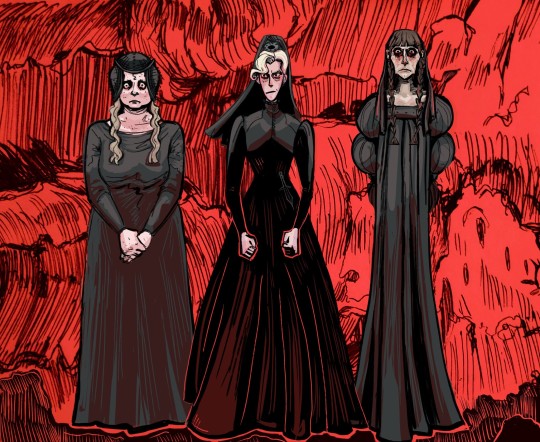
The black brides
#elinor costayne#rhaena targaryen#jeyne westerling#fire and blood#asoiaf#valyrianscrolls#asoiaf art#f&b#i made an active choice to make these outfits mismatched and devoid of heraldry given the circumstances of the wedding#elinor getting a simple dress thrown together rheana picking a dress from the targ vault with as many buttons as possible and jeyene wearin#one of her good dresses she already had dyed for mourning in the past few months as the death of her husband died with aegon rather than a#a week previously like elinors#also kinda headcannon her son was the first in a longer marrige so i could make her a little older design wise#also the faint dagger outline in rhaena's dress is meant to be bellow the garmet the outline was just my way to show its presence#btw the background lines was a texture study of birch bark from my sketchbook i recoulored visually#also pin on rhaena's viel is an heirloom last worn by visenya added at the last minute#my art
590 notes
·
View notes
Text


#tomgreg#greg would say um well it’s certainly a possibility given the um. often capricious nature of our like– our general circumstances i guess#1k
2K notes
·
View notes
Text


Zenos viator Galvus and him trying to deal with actually feeling things for once (Even if he doesn't really understand how to handle the comfort he receives from others for it)
I am also giving this man a dad that actually cares, because this brainworm have gotten me and there is no saving me from them.
#ffxiv#sketch#zenos yae galvus#adventurer zenos#durante#zero#local man learns how to feel again... and is regretting it immensely-#as his old habits of “ignore” or “shut down” dont work that well anymore#because#at least from what I've personally looked into#unironically zenos' method of reaper contract was the smartest way to go about- he wouldnt have had the context that they used to be people#but I also write Zenos with the thought that he would abhor becoming anything like Varis-#and I dont think he'd like being directly responsible for turning another person into a weapon or a tool like how he was- intentional or no#and I think its just a neat point of tension between adventurer zenos and zero#and it just ends feeding into what I write one of his main hurdles being#his resignation that he may never change- or that he isnt worth compassion because of the circumstances he grew up in#and him being so ready to take blame and resign the possibility of apologizing because (given context) i dont doubt#that Varis had constantly blamed him for Carosa's death#and it also just gives me a bit of reasoning why him being called a monster (specifically thinking of the scene with Krile) sets him off#I also just like the idea of Durante taking him in as a hesitant mentor and accidently bonding with him- even beyond the theories I have#(and this is totally me being biased because I ADORE durante as a character)#but I think helping Zenos and the way Zenos and Wol would later interact with each other would give him a measure of peace#of being able to guide someone and be there for someone like it seemed golbez was for him#I also think zenos deserves at least one warm fatherly hug#and who better than the strange old ass voidsent who could honestly probably rotate him any moment his guard is down
82 notes
·
View notes
Text
I know Tallulah is kinda (in)famous for being the 'angst egg', but it always stands out to me how resentful she seems to feel about that reputation- Creation calling her 'trauma shell' and how jokes about her family situation always upset her because she feels like that's all people see her as- a poor, sad, helpless, little girl.
She hates when others define her by the tragedies in her life as if it's the most important part of her- to her it feels both mocking and like a roadblock in her attempts to heal and grow... and it doesn't help that bad things out of her control do just keep on happening which will also just add to the lasting perception others around have of her that Tallulah wants to move on from.
#qsmp#tallulah#(of course given certain current circumstances Talsy will be able to move on from some parts of her past...)#(but given the shit happening to Phil and now Chay going missing... life just doesn't seem to want to give her a break)#(but anyway the point of this is that I sometimes feel like people reduce to Talsy as just an 'angst muffin' which doesn't feel accurate)
160 notes
·
View notes
Text










Rhys + Absolutely taking me OUT with the latest part of his
RDR2 Playthrough
BONUS:

#Rhys Darby#Edit#RDR2#I think it's utterly absurd to be like 'STEDE-CODED'#GIVEN THE UH#VERY OBVIOUS CIRCUMSTANCES LMAO#BUT //STEDE-CODED//#THE LAST TWO BITS IN PARTICULAR LIKE PLEASE#I'm so happy he's playing more sdkjssdkls I HOPE HE KEEPS AT IT#I'M STILL CRYING OVER SKYRIM HAVING JUST ONE PART
161 notes
·
View notes
Text
It remains so funny to me that Caleb's idea of 'settled' is definitely "stirring up revolutionary talk in the capital like a 19th century philosophy professor while his wanted criminal boyfriend shows up on his front porch once a week in the flimsiest disguise imaginable." Icon shit.
#yes this is a really specific pull. yes I stand by it.#don't @ me.#caleb has more respect for women than a 19th century philosophy professor tho and we all thank god for that.#but also. essek. bby. not even like into the foyer? is this basically the dezran thain disguise??? cuz that's what it sounds like???#do you think ludinus da'leth does not know who is strolling up the front walk?#he absolutely has tabs kept on caleb. he knows babe.#you are small potatoes to him.#(I say. given tiefic. but like....... that's extenuating circumstances lmao. and oh boy does it get worse. :))) )#don't worry about it certainly no implications for the chapter this week none whatsoever :)#caleb widogast#critical role#cr spoilers
2K notes
·
View notes
Text
i get the feeling that jiang cheng is holding the deaths of jfm yzy and jyl (and jzx) over wei wuxian's head because he feels as tho he needs a more honorable (valid) excuse to hate him, because admitting that he hates him for leaving would be in his eyes to admit to still caring about wwx and to admit to weakness.
"i hate you for the deaths you caused" is noble and righteous.
"i hate you for leaving me" is weak and pathetic.
but i do think it's the latter point that's the real hold-out, if wei wuxian had found a way to stay, to keep his oath to be jiang cheng's subordinate, to keep being half of the twin heroes of yunmeng... i think jiang cheng would have forgiven him.
#i mean at the same time wwx literally could never have stayed given the circumstances#but i think up until the siege of the burial mounds he could have gone back to jiang cheng#anyways i haven't actually cried watching the untamed before but i'm at their confrontation in the guanyin temple#and i am crying like a BITCH now so#this is so fun i love this show and all the pain it causes me#jiang cheng#wei wuxian#yunmeng siblings#mdzs#the untamed#gwen's liveblogging again
77 notes
·
View notes
Text
Well, that was a much bigger shitstorm than I had been expecting.
First of all, kid's ok, they just kept him over night because he's so young and concussions are a bit more of a risk, especially given his extensive medical history. Thankfully though, he seems to be on the mend, and he should be home by the time you Darlings are seeing this post.
As for why you're seeing this post, originally I was just meant to be playing emergency babysitter until the dad finished work and got home, but unfortunately he's just as big of a piece of shit as he usually is (Why they're still together and actively having more kids I have no idea) and decided that since someone was already with the kids, then instead of rushing home like he was asked to by his wife, he was going to make the best of it and go out drinking with his friends.
Both his wife and his elderly mother in law tried to contact him, but after the third set of calls, he turned off his phone. Not once did he ask who was with his kids, or how his injured son was, all he cared about was going out and drinking. (I sincerely hope she leaves his arse soon. Holy shit)
The mum did apologise to me repeatedly, but since their only living family is her elderly mother who is by no means capable of looking after five kids under the age of seven, she really didn't have a choice but to rely on me until her or her (shitty) husband could return home. And for obvious reasons, she couldn't exactly leave a four year old in the hospital by himself.
In the end, the "dad" didn't get home until about nine am this morning, stinking of grog, and I don't feel comfortable leaving them with him. I did quickly head back and grab a charger for my phone so that I could type this up, but since the youngest ones will be waking from their after feed nap soon, and the mum is still a way's off from getting back, I'm probably not going to have time to sort through my reblogs properly.
On a small positive note though, it does look like all my stuff is back now, so I should be able to go back to posting older reblogs tomorrow. For now, I'm just going to focus on the kids and then go back and crash into my own bed.
Thank you for your understanding and patience, Darling ones. Please remember to take care of yourselves 🖤
#mod speaks#update#Given the circumstances I haven't felt comfortable sleeping while I'm here either#so I am super tired and grumpy. Which is not the best state to be in when interacting with others#I'm also sorry this is such a long ramble#but situations like this where children are involved tend to rile me up in the worst way#so unless I want to be charged with murdering this piece of shit father#I needed to do something else to vent. Thus. This post.#Sorry again Darlings#feel free to scroll past
113 notes
·
View notes
Text
The fact that the Doof had been paired and proved most compatible with Perry, canonically and repeatedly proclaimed to be one of OWCA's best agents in the field, is curious to me.
Some fics have a throwaway line or two talking referring to his compatibility with other agents. I think, also, about the canonical fact that he remains as third most dangerous evil scientist in OWCA's ledger.
I also like thinking about the fact that we have been proven, multiple times, in VARIOUS dimensions and fluctuations to the time space continuem, that were he not continuously thwarted throughout his career, he would not only have achieved tyrannical rule, he would have EXCELLED in it, and perfectly undefeated, EVEN BY HIS EVIL PEERS that people loved to pretend were always more competent than him.
Like. I think about that. Why? What makes Heinz so dangerous? What made everyone else incompatible to a point OWCA realized they needed to send their best, and he needed to be on call ALL THE TIME?
Curious
#I turn the concept around in my head a lot#why not put him in jail? in OWCATraz?#the answer has to be the fact that you couldnt put him down that way. Either by political influence (his brother is a famous politician)#legal loopholes (his ex wife is a highly successful lawyer with old money)#or straight up ingenuity#Jail wouldnt have been able to stop him#arguably#such was the case with most evil scientists who are given a permaneng nemesis#like there must be somekind of prevalent circumstance that can't make them one and done#its such an interesting worldbuilding pursuit of thought#i really like they always make him a very powerful and malevolent villain in so many canon AUs#I love it when canon acknowledges his dangerous potential#i love villains#but exploring Heinz's specific type of villainy is so interesting and fun and new#heinz doofenshmirtz#perry the platypus#phineas and ferb#OWCA
142 notes
·
View notes